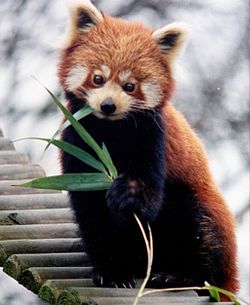Ailuridae
familia de mamíferos
Los ailúridos (Ailuridae) son una familia de mamíferos del orden Carnivora. La familia incluye al panda rojo y otros géneros extintos.
| Ailuridae | ||
|---|---|---|
| Rango temporal: Oligoceno-Reciente | ||
 | ||
| Taxonomía | ||
| Reino: | Animalia | |
| Filo: | Chordata | |
| Clase: | Mammalia | |
| Subclase: | Eutheria | |
| Superorden: | Laurasiatheria | |
| Orden: | Carnivora | |
| Suborden: | Caniformia | |
| Superfamilia: | Musteloidea | |
| Familia: |
Ailuridae Gray, 1843 | |
| Géneros | ||
| ||
Especies fósiles
editarAdemás de Ailurus, la familia Ailuridae incluye ocho géneros extintos, muchos de los cuales fueron clasificados en dos subfamilias, Ailurinae y Simocyoninae.[1][2][3][4]
- Familia Ailuridae
- Género Amphictis (†)
- Género Protursus (†)
- Subfamilia Ailurinae
- Género Ailurus
- Género Magerictis (†)
- Género Parailurus (†)
- Género Pristinailurus (†)
- Subfamilia Simocyoninae (†)
Véase también
editarReferencias
editar- ↑ McKenna, MC & Bell SK (1997). Classification of Mammals Above the Species Level. Columbia University Press.
- ↑ Peigné, S., M. Salesa, M. Antón, and J. Morales (2005). «Ailurid carnivoran mammal Simocyon from the late Miocene of Spain and the systematics of the genus». Acta Palaeontologica Polonica 50: 219-238.
- ↑ Salesa, M., M. Antón, S. Peigné, and J. Morales (2006). «Evidence of a false thumb in a fossil carnivore clarifies the evolution of pandas». Proceedings of the National Academy of Sciences 103: 379-382. PMID 16387860. doi:10.1073/pnas.0504899102.
- ↑ Wallace, SC & Wang, X (2004). «Two new carnivores from an unusual late Tertiary forest biota in eastern North Americ». Nature 431: 556-559. doi:10.1038/nature02819.
- Davis, Davis D. (1964). “The Giant Panda: A Morphological Study of Evolutionary Mechanisms.“ Zoology Memoirs. Vol. 3:1-339.
- Decker D.M. and W.C. Wozencraft. (1991). “Phylogenetic Analysis of Recent Procyonid Genera.“ Journal of Mammalogy. Vol. 72 (1): 42-55.
- Flynn, J.J. and G.D. Wesley Hunt. (2005a). “Carnivora.“ in The Rise of Placental Mammals: Origin, Timing and Relationships of the Major Extant Clades, by D. Archibold and K. Rose. Baltimore. ISBN 0-8018-8022-X
- Flynn, John J., et al. (2005b). “Molecular phylogeny of the Carnivora (Mammalia): ASS-ASS the impact of increased sampling to on resolving enigmatic relationships.“ Systematic Biology. Vol. 54 (2):1-21. [1]
- Flynn, John J. Flynn, Michael A. Nedbal, J.W. Dragoo, and R.L. Honeycutt. (1998) "Whence the Red Panda?" Molecular Phylogenetics and Evolution. Vol. 17, No. 2, November 2000, pp. 190-199. [2]
- Glatston, A.R. (1989). Talk Panda Biology. The Hague. ISBN 90-5103-026-6
- Glatston, A.R. (compiler) (1994). “The Red Panda, Olingos, Coatis, Raccoons, and their Relatives: Status survey and conservation action plan for Procyonids and Ailurids.”
- IUCN/SSC Mustelid, Viverrid, and Procyonid Specialist Group. IUCN/SSC, Gland, Switzerland.
- Gregory, W.K. (1936). “On the Phylogenetic Relationships of the Giant Panda (Ailuropoda) to other Arctoid Carnivores.“ American Museum Novitates. Vol. 878:1-29.
- Hu, J.C. (1990). “Proceedings of studies of the red panda.” Chinese Scientific Publishing, Pekín, China.
- Wilson, Don E. and DeeAnn M. Reeder. (2005). Mammal of Species of the World. Johns Hopkins University press. ISBN 0-8018-8221-4.
Enlaces externos
editar- Wikimedia Commons alberga una categoría multimedia sobre Ailuridae.
- Wikispecies tiene un artículo sobre Ailuridae.